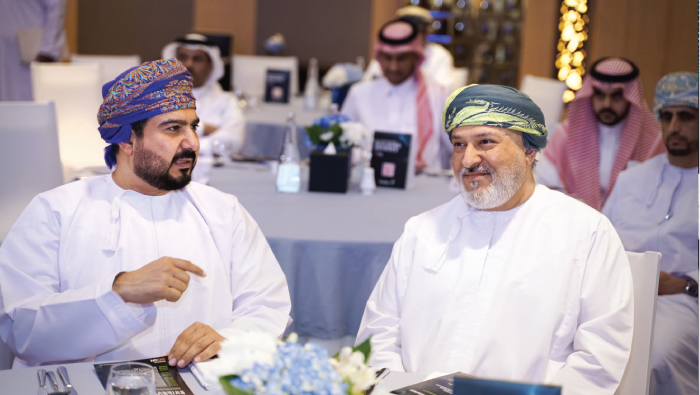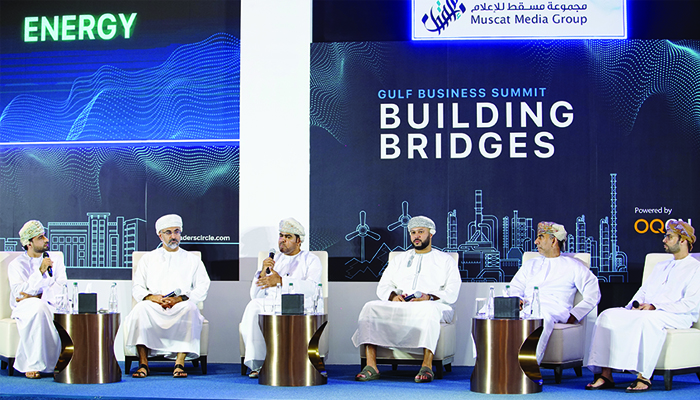

MUSCAT: Buoyed by the oversubscription of initial public offering (IPO) of OQ Gas Networks (OQGN), the sole operator of Oman’s gas transportation system, a senior OQGN official said that “exciting times lie ahead in the renewable energy sectors and there is a piece of pie for every player.”
The IPO received a good response from local, regional, and international investors and was oversubscribed by nearly 14 times, making it the largest IPO in the sultanate. Total demand for the OMR288mn IPO surpassed OMR 4bn, resulting in an oversubscription level of 13.9 times, for all tranches combined.
While the data was released by OQGN on X, formerly Twitter, on Wednesday, Saif Al Hosni, Vice-President of Gas Network Management at OQGN, predicted that the IPO has “surpassed the expectations”. The OQGN IPO opened for public subscription on September 26 and closed on October 9.
Speaking in a panel discussion on energy sector at the summit, titled Building Bridges: Exploring the Economic and Strategic Implications of Saudi Arabia-Oman MoUs and Vision Plans, Al Hosni said: “OQGN subscription was a huge success. We have a growth strategy that focuses on our core business – transporting natural gas – but it also involves clean energy, renewables and decarbonisation. This is why we are here to talk about energy, technology and sustainability.
“We have great aspirations for transporting hydrogen and also C02 to support CCUS initiatives in the country. We know that the government is paying detailed attention to the sector. If hydrogen is there to replace natural gas then we are also keen to be a critical player in transporting hydrogen.”
On Oman’s Net Zero 2050 goals, Al Hosni said: “The country is trying to take the best practices and best learning from other countries. It is an ambitious goal but it is doable. It is phased out and gradually we can achieve it but every sector in the value chain has a role to play to achieve it.”
Plans for two blue hydrogen projects
The senior OQGN official said: “There is still demand for fossilised fuel. It will be a gradual transition and blue hydrogen presents the stepping stone between conventional oil and gas and green hydrogen. There are plans for two blue hydrogen projects in Oman.”
He added: OQGN was the first company to sign a MoU with Hydrom, the national orchestrator for green hydrogen. We set this goal of transporting green hydrogen. We have signed a MoU with Fluxys Belgium, Belgium’s independent operator of the high-pressure natural gas transmission network, the natural gas storage infrastructure and the liquefied natural gas (LNG) terminal. They share similar goals and aspirations with us and we believe this partnership will help us strengthen our position to be the national partner of choice for transporting hydrogen in the country.”
“We are also partnering with other conventional oil and gas companies, either upstream or downstream, who want to capture CO2. We are thinking of ways to transport captured CO2 to areas for storage and utilisation.”
He said: “Hydrom will be responsible for exporting Hydrogen from Duqm Port and Port of Salalah. At the port, the hydrogen will be transformed into green ammonia and then transported through tankers. At the destination the green ammonia would again be fragmented into hydrogen and nitrogen.
The panel discussion was moderated by well-known Shabiba TV presenter Abdullah Al Saidi, and the panel featured Abdul Rahman Al Yahyaei (CEO of OPAL), Harith Al Suleimany (Executive Director of Seven Seas Petroleum), Saif Al Hosni, Firas Al Abduwani (Director General of Renewable Energy and Hydrogen at Ministry of Energy and Minerals) and Nasser Al Maqbali (CEO of MDO).
Harith Al Suleimany, Executive Director of Seven Seas Petroleum LLC, said: “We are an integrated solutions provider and we are involved in various energy sectors. Among the verticals we have is manufacturing. The first focuses on well services and exploration production. In manufacturing, we have acquired an American company, Versa Tech, with a unit in Jebel Ali, Dubai. It specialises in manufacturing derivatives of wellhead control panels, chemical injection skids, hips systems and ESD systems.”
Fully-owned Omani company
Al Suleimany added: “One of the latest equipment is going towards green energy which is an electrolyser. Today as a fully-owned Omani company, we manufacture electrolysers that will be used in the hydrogen industry. We work with strategic partnerships and we plan to expand our business in Saudi Arabia.”
The inaugural Gulf Business Summit met with results and success as companies of Oman and Saudi Arabia signed MoUs to discuss ways to bolster trade relationships.
Seven Seas Petroleum signed a strategic agreement with Saudi Arabia’s Al Mulhem Petroleum Services Company KSA on nano-based technology that will be used in the energy industry.
Dr. Abdullah Al Dhafeeri of Al Mulhem Petroleum Services later addressed the gathering and spoke on the robust trade relationship between Oman and Saudi Arabia.
Al Suleimany said: “The agreement will open new doors of cooperation between Oman and Saudi Arabia and there is a great potential to do trade and business between the Gulf neighbours.”
Firas Al Abduwani, Director-General of Renewable Energy and Hydrogen at Ministry of Energy and Minerals said: “We [Gulf nations] are endowed with both fossil and renewable energy, and have to plan to save renewable energy. There is a clear vision, and cooperation between the GCC countries in the field of energy and the Gulf countries hope to meet Net Zero commitments by 2050.”
Human resources for alternative energies
Abdul Rahman Al Yahyaei, CEO of OPAL, said: “We welcome our brothers from the Kingdom of Saudi Arabia, and look forward to forging key partnerships with them, with regard to human resources for the renewable energy sector. The Oman Energy Association, since its establishment, has considered development of human resources as one of the most important pillars. Previously, the focus was on the oil and gas sector, but now it has shifted to alternative energy.”
Al Yahyaei emphasised that the Omani Energy Association works in close coordination with the Ministry of Labour and the Ministry of Energy and Minerals. “Currently, more than 800 Omanis are looking for work in training institutes where the training is supervised by the Omani Energy Association. In addition to that the efficiency of the required programmes, be at the level of universities, vocational colleges, or even private training institutes is also monitored,” said Al Yahyaei.
Nasser Al Maqbali, CEO of Minerals Development of Oman (MDO), underlined the growth of the mining sector and said that “Oman’s rich mineral wealth can help in the energy transformation.”
He added: “We have noticed that market prices for metals are dynamic, but copper, which is found in good quantities in Oman, has high demand and prices.”
In his welcome speech, Ali bin Hamad Al Rahbi, Assistant CEO of Development at Muscat Media Group, said: “The first Gulf Business Summit provides a platform to explore economic opportunities in the areas of the energy and technology sectors and sustainability.”
“Muscat Media Group’s venture to hold the summit coincides with the growing strong Omani-Saudi Arabia trade relations in all fields, in particular, economic, commercial and tourism fields,” he added.